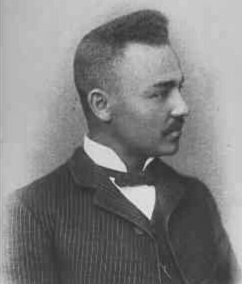Frank H. Johnson Family History
By Lola Mae Johnson Gauff
Alice Rowan Johnson was the first African American Teacher in Riverside County. The year was 1896.
Alice and Frank’s youngest child, Alice lived on Ninth and Kansas. Frank’s parents, Pleasant and Hettie Johnson lived next door.

Rev. Frank Johnson
Frank H. Johnson left the family farm in Atchison, Kansas on a cold dreary day on the Santa Fe train in January, 1886 and arrived in Colton, California where he changed to the Southern Pacific as the Santa Fe line had not been completed to Los Angeles.
He was employed by Brown and Foster Hardware Company and drove a team of horses and wagon and made deliveries. Frank remembered at times his wagon and horse became mired in the mud on unpaved Second and Spring Streets, the busiest intersection in Los Angeles in 1886.
Frank attended night school and became proficient in singing, playing the flute and speaking. He joined the African Methodist Episcopal Church located near Azusa and San Pedro Streets in Los Angeles with Rev. Jordan Allen as the pastor. Frank became a singing evangelist and was asked to go to the bawdy town of miners in San Bernardino. It was in San Bernardino on this speaking and singing engagement that he was invited to the home of Lizzy and Charles Rowan for dinner, one of the wealthiest African American families in California. They had a son, Byron who was one of the original owners of the Twenty Mule Team Borax Mines and was a friend of Death Valley Scotty. Their daughter, Alice graduated as a teacher from California State Normal (forerunner of UCLA) in 1888. Within four years Alice Rowan and Frank Johnson were married by Rev. Westenburg in the white Methodist Church in San Bernardino. An elaborate dinner reception was given at the Rowan Estate. It made news in the white paper as well as the Los Angeles EAGLE, a popular African American paper.
The now wealthy Lizzy Rowan, Frank learned, drove a covered wagon and a team of oxen in a caravan of three hundred wagons as a slave girl of sixteen from South Carolina with the Mormon Flake family to San Bernardino in 1856 during the gold rush in California. The trip took two years with much suffering, sickness and raids by the Indians. In many instances there were no trails and they made new ones by fording streams, took their wagon apart and let them down piece-by-piece over canyons and wash-outs. They camped at night with their wagons in a circle with the livestock in the center.
Lizzy Flake’s Mormon slave owners were among the first settlers in San Bernardino. There is a bronze plaque with Lizzy’s name and others in front of the San Bernardino County Court House. After Lizzy was freed, since slavery was forbidden in California she acquired valuable property on Rialto and G Streets in San Bernardino and it stayed in her family for years. Her grandson, Ralph, my half-brother became heir of it. She left a will on file in San Bernardino leaving her property, beautiful antique furniture and engraved silver to her daughter and grandchildren which were Alice Rowan Johnson and Frank Johnson’s children. Their son Byron had no living children.
Alice taught in the Loma District in San Bernardino in 1890. After she and Frank married and moved to Riverside where Frank was employed by Stewart and Lett Hardware. This was seven years before he acquired his own business JOHNSON CARRIAGE COMPANY at the turn of the century. Alice taught in Riverside in 1896 is what is believed to be the Jurupa District now.
Alice and Frank reared their family of three boys and two girls in Riverside. Their youngest child, Alice lived on Ninth and Kansas. Frank’s parents, Pleasant and Hettie Johnson lived next door.
Ironically, Alice and Frank married on Christmas Day in 1892 and Alice died on Christmas Eve in 1912. After her death, Frank married a widow, Anna Thomas with two small daughters, Lois and Kingdon. Their father was Fred Thomas who ran a barber shop in Riverside. He died in Riverside in 1912. After Frank and Anna married they had two daughters, Anita and Lola Mae.